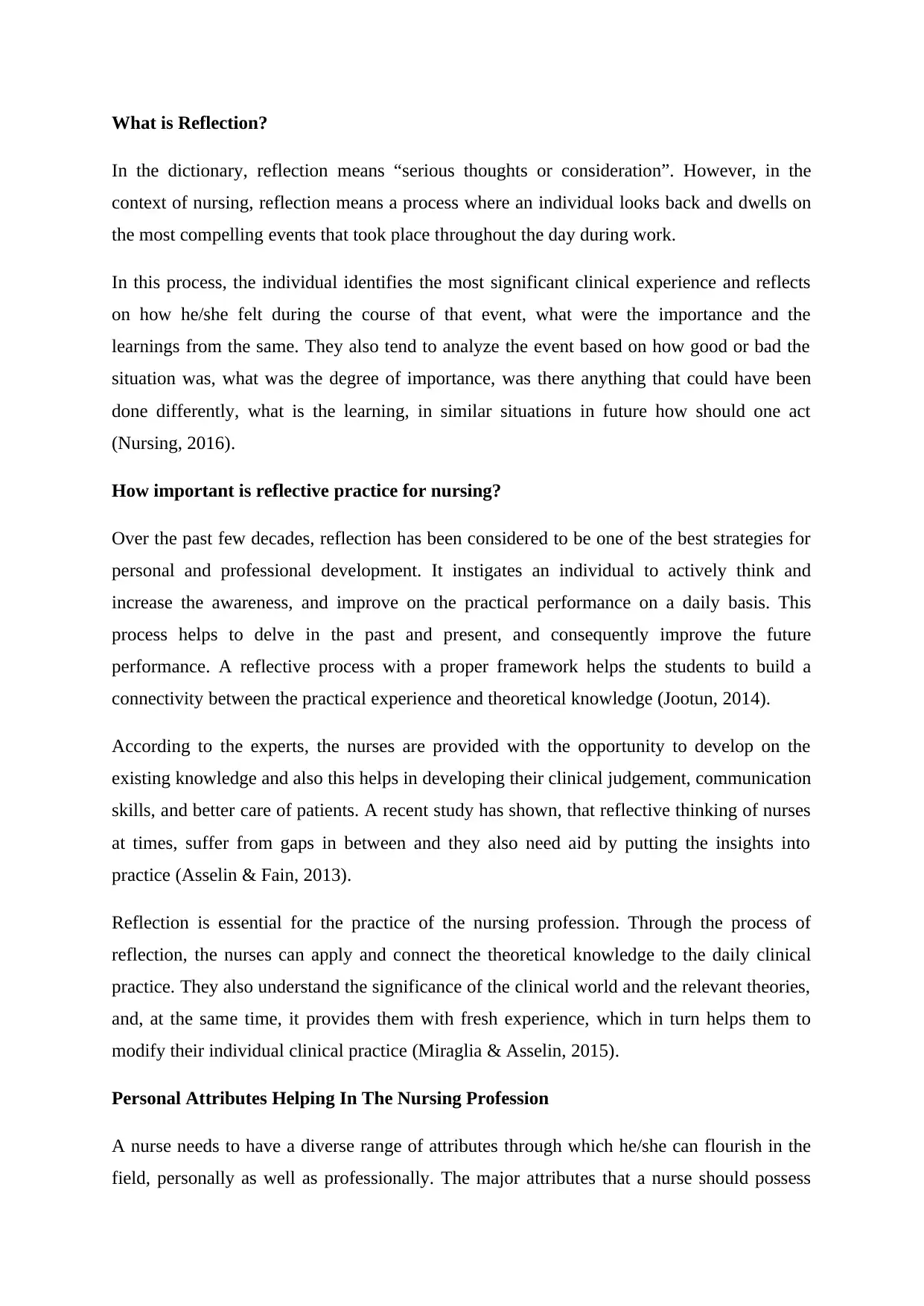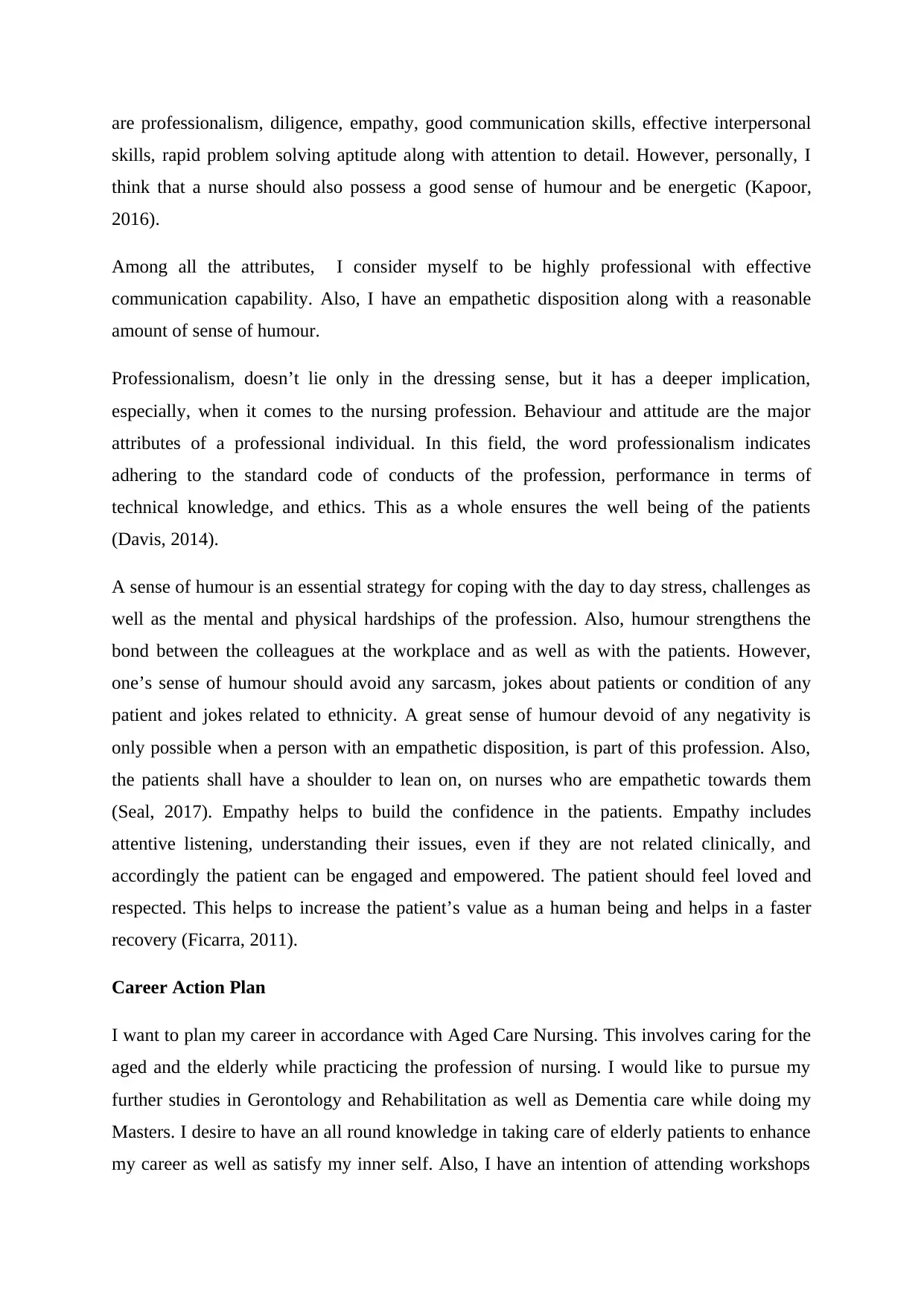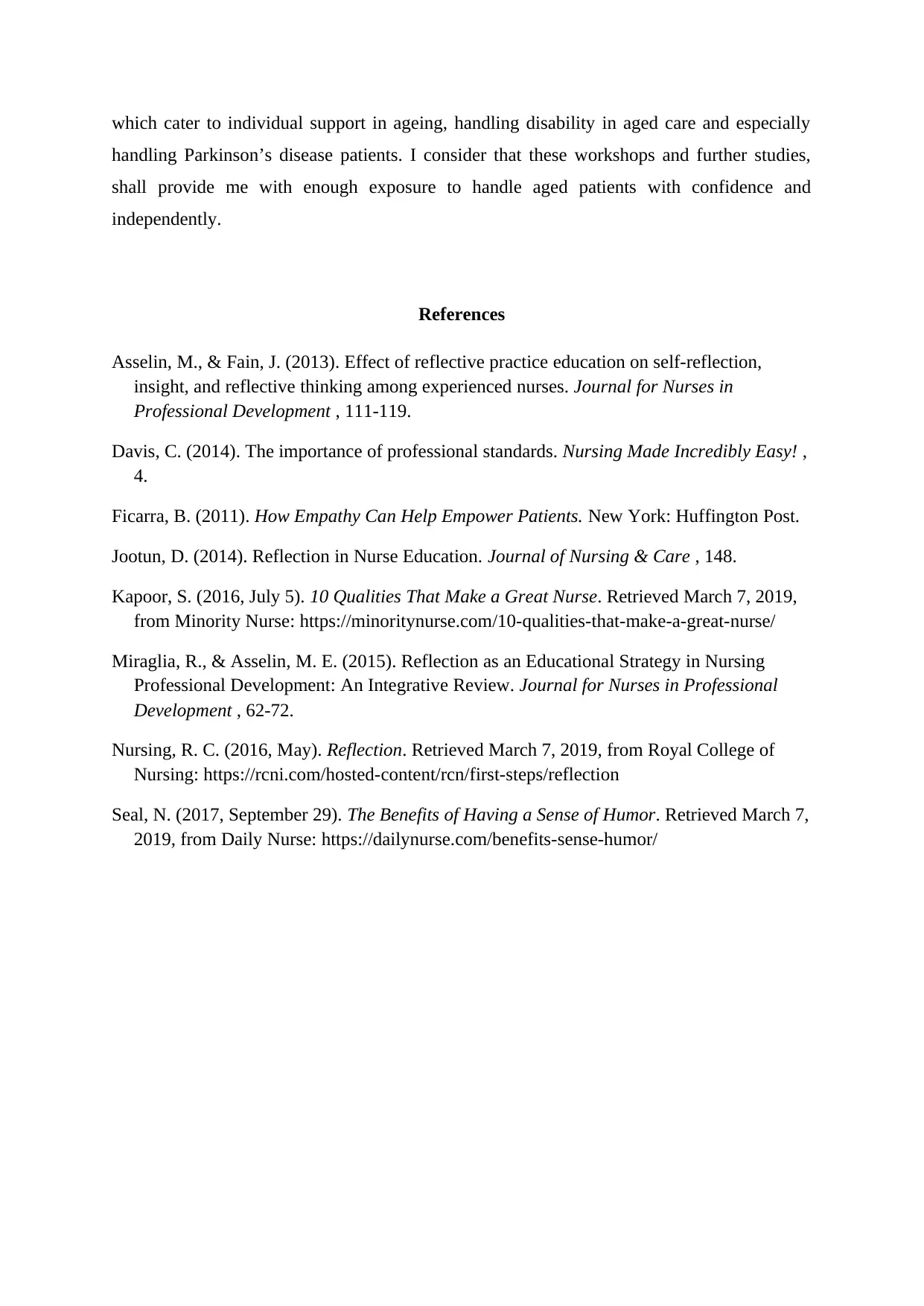Nursing: Reflective Practice, Personal Attributes & Career Action
VerifiedAdded on 2023/04/25
|3
|1166
|418
Essay
AI Summary
This essay delves into the concept of reflection in nursing, emphasizing its importance for personal and professional development. It highlights the significance of reflective practice in connecting theoretical knowledge with practical experience, enhancing clinical judgment, and improving patient care. The essay also identifies key personal attributes crucial for success in nursing, such as professionalism, empathy, communication skills, and a sense of humor. Furthermore, it outlines a career action plan focused on aged care nursing, including pursuing further studies in gerontology, rehabilitation, and dementia care, as well as attending workshops to enhance skills in handling elderly patients with confidence. This assignment solution is available on Desklib, a platform offering a wide range of study resources for students.

What is Reflection?
In the dictionary, reflection means “serious thoughts or consideration”. However, in the
context of nursing, reflection means a process where an individual looks back and dwells on
the most compelling events that took place throughout the day during work.
In this process, the individual identifies the most significant clinical experience and reflects
on how he/she felt during the course of that event, what were the importance and the
learnings from the same. They also tend to analyze the event based on how good or bad the
situation was, what was the degree of importance, was there anything that could have been
done differently, what is the learning, in similar situations in future how should one act
(Nursing, 2016).
How important is reflective practice for nursing?
Over the past few decades, reflection has been considered to be one of the best strategies for
personal and professional development. It instigates an individual to actively think and
increase the awareness, and improve on the practical performance on a daily basis. This
process helps to delve in the past and present, and consequently improve the future
performance. A reflective process with a proper framework helps the students to build a
connectivity between the practical experience and theoretical knowledge (Jootun, 2014).
According to the experts, the nurses are provided with the opportunity to develop on the
existing knowledge and also this helps in developing their clinical judgement, communication
skills, and better care of patients. A recent study has shown, that reflective thinking of nurses
at times, suffer from gaps in between and they also need aid by putting the insights into
practice (Asselin & Fain, 2013).
Reflection is essential for the practice of the nursing profession. Through the process of
reflection, the nurses can apply and connect the theoretical knowledge to the daily clinical
practice. They also understand the significance of the clinical world and the relevant theories,
and, at the same time, it provides them with fresh experience, which in turn helps them to
modify their individual clinical practice (Miraglia & Asselin, 2015).
Personal Attributes Helping In The Nursing Profession
A nurse needs to have a diverse range of attributes through which he/she can flourish in the
field, personally as well as professionally. The major attributes that a nurse should possess
In the dictionary, reflection means “serious thoughts or consideration”. However, in the
context of nursing, reflection means a process where an individual looks back and dwells on
the most compelling events that took place throughout the day during work.
In this process, the individual identifies the most significant clinical experience and reflects
on how he/she felt during the course of that event, what were the importance and the
learnings from the same. They also tend to analyze the event based on how good or bad the
situation was, what was the degree of importance, was there anything that could have been
done differently, what is the learning, in similar situations in future how should one act
(Nursing, 2016).
How important is reflective practice for nursing?
Over the past few decades, reflection has been considered to be one of the best strategies for
personal and professional development. It instigates an individual to actively think and
increase the awareness, and improve on the practical performance on a daily basis. This
process helps to delve in the past and present, and consequently improve the future
performance. A reflective process with a proper framework helps the students to build a
connectivity between the practical experience and theoretical knowledge (Jootun, 2014).
According to the experts, the nurses are provided with the opportunity to develop on the
existing knowledge and also this helps in developing their clinical judgement, communication
skills, and better care of patients. A recent study has shown, that reflective thinking of nurses
at times, suffer from gaps in between and they also need aid by putting the insights into
practice (Asselin & Fain, 2013).
Reflection is essential for the practice of the nursing profession. Through the process of
reflection, the nurses can apply and connect the theoretical knowledge to the daily clinical
practice. They also understand the significance of the clinical world and the relevant theories,
and, at the same time, it provides them with fresh experience, which in turn helps them to
modify their individual clinical practice (Miraglia & Asselin, 2015).
Personal Attributes Helping In The Nursing Profession
A nurse needs to have a diverse range of attributes through which he/she can flourish in the
field, personally as well as professionally. The major attributes that a nurse should possess
Paraphrase This Document
Need a fresh take? Get an instant paraphrase of this document with our AI Paraphraser

are professionalism, diligence, empathy, good communication skills, effective interpersonal
skills, rapid problem solving aptitude along with attention to detail. However, personally, I
think that a nurse should also possess a good sense of humour and be energetic (Kapoor,
2016).
Among all the attributes, I consider myself to be highly professional with effective
communication capability. Also, I have an empathetic disposition along with a reasonable
amount of sense of humour.
Professionalism, doesn’t lie only in the dressing sense, but it has a deeper implication,
especially, when it comes to the nursing profession. Behaviour and attitude are the major
attributes of a professional individual. In this field, the word professionalism indicates
adhering to the standard code of conducts of the profession, performance in terms of
technical knowledge, and ethics. This as a whole ensures the well being of the patients
(Davis, 2014).
A sense of humour is an essential strategy for coping with the day to day stress, challenges as
well as the mental and physical hardships of the profession. Also, humour strengthens the
bond between the colleagues at the workplace and as well as with the patients. However,
one’s sense of humour should avoid any sarcasm, jokes about patients or condition of any
patient and jokes related to ethnicity. A great sense of humour devoid of any negativity is
only possible when a person with an empathetic disposition, is part of this profession. Also,
the patients shall have a shoulder to lean on, on nurses who are empathetic towards them
(Seal, 2017). Empathy helps to build the confidence in the patients. Empathy includes
attentive listening, understanding their issues, even if they are not related clinically, and
accordingly the patient can be engaged and empowered. The patient should feel loved and
respected. This helps to increase the patient’s value as a human being and helps in a faster
recovery (Ficarra, 2011).
Career Action Plan
I want to plan my career in accordance with Aged Care Nursing. This involves caring for the
aged and the elderly while practicing the profession of nursing. I would like to pursue my
further studies in Gerontology and Rehabilitation as well as Dementia care while doing my
Masters. I desire to have an all round knowledge in taking care of elderly patients to enhance
my career as well as satisfy my inner self. Also, I have an intention of attending workshops
skills, rapid problem solving aptitude along with attention to detail. However, personally, I
think that a nurse should also possess a good sense of humour and be energetic (Kapoor,
2016).
Among all the attributes, I consider myself to be highly professional with effective
communication capability. Also, I have an empathetic disposition along with a reasonable
amount of sense of humour.
Professionalism, doesn’t lie only in the dressing sense, but it has a deeper implication,
especially, when it comes to the nursing profession. Behaviour and attitude are the major
attributes of a professional individual. In this field, the word professionalism indicates
adhering to the standard code of conducts of the profession, performance in terms of
technical knowledge, and ethics. This as a whole ensures the well being of the patients
(Davis, 2014).
A sense of humour is an essential strategy for coping with the day to day stress, challenges as
well as the mental and physical hardships of the profession. Also, humour strengthens the
bond between the colleagues at the workplace and as well as with the patients. However,
one’s sense of humour should avoid any sarcasm, jokes about patients or condition of any
patient and jokes related to ethnicity. A great sense of humour devoid of any negativity is
only possible when a person with an empathetic disposition, is part of this profession. Also,
the patients shall have a shoulder to lean on, on nurses who are empathetic towards them
(Seal, 2017). Empathy helps to build the confidence in the patients. Empathy includes
attentive listening, understanding their issues, even if they are not related clinically, and
accordingly the patient can be engaged and empowered. The patient should feel loved and
respected. This helps to increase the patient’s value as a human being and helps in a faster
recovery (Ficarra, 2011).
Career Action Plan
I want to plan my career in accordance with Aged Care Nursing. This involves caring for the
aged and the elderly while practicing the profession of nursing. I would like to pursue my
further studies in Gerontology and Rehabilitation as well as Dementia care while doing my
Masters. I desire to have an all round knowledge in taking care of elderly patients to enhance
my career as well as satisfy my inner self. Also, I have an intention of attending workshops

which cater to individual support in ageing, handling disability in aged care and especially
handling Parkinson’s disease patients. I consider that these workshops and further studies,
shall provide me with enough exposure to handle aged patients with confidence and
independently.
References
Asselin, M., & Fain, J. (2013). Effect of reflective practice education on self-reflection,
insight, and reflective thinking among experienced nurses. Journal for Nurses in
Professional Development , 111-119.
Davis, C. (2014). The importance of professional standards. Nursing Made Incredibly Easy! ,
4.
Ficarra, B. (2011). How Empathy Can Help Empower Patients. New York: Huffington Post.
Jootun, D. (2014). Reflection in Nurse Education. Journal of Nursing & Care , 148.
Kapoor, S. (2016, July 5). 10 Qualities That Make a Great Nurse. Retrieved March 7, 2019,
from Minority Nurse: https://minoritynurse.com/10-qualities-that-make-a-great-nurse/
Miraglia, R., & Asselin, M. E. (2015). Reflection as an Educational Strategy in Nursing
Professional Development: An Integrative Review. Journal for Nurses in Professional
Development , 62-72.
Nursing, R. C. (2016, May). Reflection. Retrieved March 7, 2019, from Royal College of
Nursing: https://rcni.com/hosted-content/rcn/first-steps/reflection
Seal, N. (2017, September 29). The Benefits of Having a Sense of Humor. Retrieved March 7,
2019, from Daily Nurse: https://dailynurse.com/benefits-sense-humor/
handling Parkinson’s disease patients. I consider that these workshops and further studies,
shall provide me with enough exposure to handle aged patients with confidence and
independently.
References
Asselin, M., & Fain, J. (2013). Effect of reflective practice education on self-reflection,
insight, and reflective thinking among experienced nurses. Journal for Nurses in
Professional Development , 111-119.
Davis, C. (2014). The importance of professional standards. Nursing Made Incredibly Easy! ,
4.
Ficarra, B. (2011). How Empathy Can Help Empower Patients. New York: Huffington Post.
Jootun, D. (2014). Reflection in Nurse Education. Journal of Nursing & Care , 148.
Kapoor, S. (2016, July 5). 10 Qualities That Make a Great Nurse. Retrieved March 7, 2019,
from Minority Nurse: https://minoritynurse.com/10-qualities-that-make-a-great-nurse/
Miraglia, R., & Asselin, M. E. (2015). Reflection as an Educational Strategy in Nursing
Professional Development: An Integrative Review. Journal for Nurses in Professional
Development , 62-72.
Nursing, R. C. (2016, May). Reflection. Retrieved March 7, 2019, from Royal College of
Nursing: https://rcni.com/hosted-content/rcn/first-steps/reflection
Seal, N. (2017, September 29). The Benefits of Having a Sense of Humor. Retrieved March 7,
2019, from Daily Nurse: https://dailynurse.com/benefits-sense-humor/
⊘ This is a preview!⊘
Do you want full access?
Subscribe today to unlock all pages.

Trusted by 1+ million students worldwide
1 out of 3
Related Documents
Your All-in-One AI-Powered Toolkit for Academic Success.
+13062052269
info@desklib.com
Available 24*7 on WhatsApp / Email
![[object Object]](/_next/static/media/star-bottom.7253800d.svg)
Unlock your academic potential
Copyright © 2020–2026 A2Z Services. All Rights Reserved. Developed and managed by ZUCOL.





